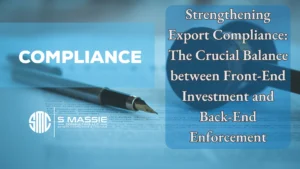Earth Day and International Trade
On this Earth Day, we at S Massie Consulting LLC want to take a moment to reflect on the importance of international trade and how it reminds us our global responsibility in our efforts to protect our planet. As the world becomes increasingly interconnected, it is crucial that we recognize the impact that our actions have on the environment, and work together to create sustainable solutions for the future. Whether it is reducing greenhouse gas emissions, conserving natural resources, or promoting renewable energy sources, it is clear that we all have a role to play in protecting Mother Earth.
At S Massie Consulting LLC, we believe that sustainable development and international trade go hand in hand. By promoting fair and equitable trade policies, we can create a more prosperous and environmentally responsible global community. This means not only reducing carbon emissions and protecting natural habitats, but also investing in renewable energy and promoting sustainable business practices. As we celebrate Earth Day, let us remember that we are all connected, and that together we can create a more sustainable and prosperous future for ourselves and for generations to come.

Introduction to Global Responsibility
In today’s rapidly evolving world, the pressing need for a greener future is more evident than ever. With the increasing awareness of environmental challenges, individuals, communities, and nations have come together to address these issues and work towards sustainable solutions. Earth Day, a global initiative celebrated annually on April 22nd, serves as a reminder of our collective responsibility to protect and preserve the planet. This article explores the connection between Earth Day and international trade, emphasizing the crucial role that global cooperation plays in creating a sustainable and environmentally friendly future.
The Impact of International Trade on the Environment
International trade has a significant impact on the environment, both positive and negative. While trade facilitates economic growth and promotes innovation, it also leads to increased resource consumption, pollution, and carbon emissions. The transportation of goods across long distances contributes to greenhouse gas emissions, deforestation, and habitat destruction. Therefore, it is crucial to mitigate the negative environmental consequences of international trade and promote sustainable practices.
Environmental Policies and International Cooperation
To address the environmental challenges associated with international trade, countries need to develop and enforce effective environmental policies. These policies should focus on promoting sustainable production methods, reducing carbon emissions, and conserving natural resources. International cooperation plays a vital role in sharing best practices, harmonizing environmental standards, and holding nations accountable for their environmental impact.
Promoting Sustainable Practices in International Trade
One of the key approaches to greening international trade is promoting sustainable practices throughout the supply chain. This includes adopting eco-friendly production methods, minimizing waste generation, and implementing efficient transportation systems. Companies can also engage in eco-labeling and certification programs to assure consumers of their commitment to sustainability.
The Role of Technology in Greening International Trade
Technology plays a crucial role in greening international trade. Innovations such as renewable energy sources, electric vehicles, and smart logistics systems can significantly reduce the environmental footprint of trade activities. Governments and businesses should invest in research and development to foster the adoption of environmentally friendly technologies and promote sustainable trade practices.
Encouraging Corporate Social Responsibility
Corporate social responsibility (CSR) initiatives are essential for promoting a greener future in the context of international trade. Companies can integrate sustainable practices into their operations, support local communities, and contribute to environmental conservation efforts. By taking responsibility for their ecological impact, businesses can align their economic goals with environmental sustainability.
Balancing Economic Growth and Environmental Protection
Achieving a greener future requires finding a balance between economic growth and environmental protection. Governments and policymakers need to develop strategies that promote sustainable economic development while minimizing ecological harm. This involves creating incentives for green investments, fostering innovation, and supporting industries that prioritize sustainability.
Creating Green Supply Chains
Green supply chains play a pivotal role in promoting sustainable international trade. By integrating environmentally friendly practices into the entire supply chain process, from sourcing to distribution, companies can reduce their carbon footprint, minimize waste, and ensure responsible resource management. Collaboration among suppliers, manufacturers, and logistics providers is crucial for building greener supply chains.
Education and Awareness for Sustainable Trade
Education and awareness are vital components of fostering sustainable trade practices. Governments, educational institutions, and NGOs should invest in environmental education programs to enhance public awareness about the impact of trade on the environment. By promoting eco-literacy and responsible consumption, individuals can make informed choices that contribute to a greener future.
Collaboration between Governments, NGOs, and Businesses
Creating a greener future requires collaboration among governments, non-governmental organizations (NGOs), and businesses. Public-private partnerships can facilitate the exchange of knowledge, resources, and expertise. By working together, stakeholders can develop comprehensive strategies, implement effective policies, and drive positive change in the realm of international trade.
Financing Green Initiatives
Financial institutions and investors play a critical role in driving green initiatives. By providing funding and financial incentives for sustainable projects, they can accelerate the transition towards a greener future. Governments can also develop financial mechanisms such as green bonds and subsidies to support businesses in adopting sustainable practices.
Addressing Climate Change through International Trade Agreements
International trade agreements offer an opportunity to address climate change collectively. By incorporating environmental provisions into trade agreements, nations can ensure that trade activities align with climate goals and promote sustainable development. These agreements can encourage the adoption of renewable energy, facilitate the transfer of green technologies, and promote the conservation of biodiversity.
Sustainable Development Goals and Trade
The United Nations’ Sustainable Development Goals (SDGs) provide a framework for addressing environmental, social, and economic challenges. Trade can contribute significantly to achieving the SDGs by promoting inclusive growth, poverty reduction, and environmental sustainability. By aligning trade policies with the SDGs, nations can work towards a greener and more equitable future.
Case Studies of Successful Green Trade Practices
Numerous case studies highlight successful green trade practices that have had a positive impact on the environment. These include initiatives such as fair trade, organic farming, and sustainable tourism. By studying these examples, governments, businesses, and individuals can gain insights and replicate successful strategies in their own trade practices.
Conclusion
As the world celebrates Earth Day, it is crucial to recognize our global responsibility for a greener future. International trade plays a significant role in shaping the environmental landscape, and it is imperative to prioritize sustainable practices. By embracing green initiatives, promoting international cooperation, and balancing economic growth with environmental protection, we can pave the way for a sustainable and prosperous future.
FAQs
Earth Day is a global initiative celebrated annually on April 22nd, dedicated to raising awareness about environmental issues and promoting sustainable practices. It is important as it reminds us of our collective responsibility to protect the planet for future generations.
Technology plays a crucial role in greening international trade by offering innovative solutions. Renewable energy sources, electric vehicles, and smart logistics systems can significantly reduce the environmental footprint of trade activities. By embracing and investing in such technologies, we can promote sustainability in international trade.
Education plays a vital role in promoting sustainable trade practices. By raising awareness about the impact of trade on the environment and promoting eco-literacy, individuals can make informed choices that contribute to a greener future. Educational institutions, governments, and NGOs should invest in environmental education programs to enhance public awareness.
Collaboration between governments, non-governmental organizations (NGOs), and businesses is crucial for driving positive change in international trade. Through public-private partnerships, stakeholders can exchange knowledge, resources, and expertise, and develop comprehensive strategies to promote sustainability in trade.
International trade agreements offer an opportunity to address climate change collectively. By incorporating environmental provisions into trade agreements, nations can ensure that trade activities align with climate goals and promote sustainable development. These agreements can encourage the adoption of renewable energy, facilitate the transfer of green technologies, and promote biodiversity conservation.
Numerous successful green trade practices exist, such as fair trade, organic farming, and sustainable tourism. These practices prioritize environmental sustainability, social responsibility, and economic viability. By studying and replicating these examples, governments, businesses, and individuals can contribute to a greener future.


